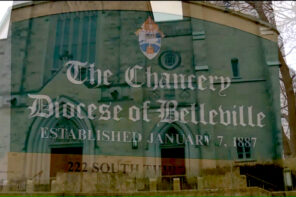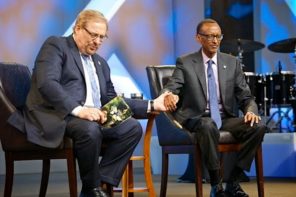As we noted on New Year’s Eve, GLAAD posted a great year-end roundup of five big advances on LGBT issues among religious communities in 2012, all of which were part of RD’s coverage this past year: religious voices in marriage equality battles, greater visibility for pro-equality Catholics and Mormons, a further embrace of LGBT equality in the Episcopal church, and the emergence of LGBT voices on campus at religious colleges.
Look for all these stories—and some of the not-such-good-news we covered in 2012—to continue making waves in 2013.
Civil Marriage and Uncivil Religion
On New Year’s Day, same-sex couples in Maryland started getting legally married—joining those in Washington state and Maine, where voters had also given a thumbs-up in a remarkable set of November election victories. Pro-equality activists are working to build on those victories with legislative campaigns in Illinois, Minnesota, and several other states to win marriage equality this year. And of course the Supreme Court will be hearing cases on Prop. 8 and DOMA in March, with decisions in June.
One of the biggest stories of last year’s marriage victories was the growing gap between the increasingly strident Catholic hierarchy and American Catholics themselves. Catholic governors Martin O’Malley in Maryland and John Baldacci in Maine played important roles in last year’s victories, and pro-equality Catholic activists were energetically visible and active in all the states with marriage on the ballot.
The message from the hierarchy doesn’t seem like it’s going to change. The Pope ended the year denouncing gays as contrary to nature in his Christmas message, and started this year, in his New Year’s Peace Day message, denouncing marriage equality as a kind of “false peace.” Meanwhile, in Illinois, Cardinal Francis George and his fellow bishops released a letter denouncing marriage equality as a “fiction” that “nature itself tells us is impossible.” Marriage equality, the letter says, would be in opposition to “the common good of society” and “the common sense of the human race.” The bishops even announced they’ll repeat this year’s failed “Fornight for Freedom” campaign in 2013.
But as last year’s elections made clear, the Pope, the U.S. Conference of Catholic Bishops, and their allies in the Knights of Columbus and National Organization for Marriage can rage about threats to the family and religious liberty, and they can even go after the Girl Scouts, but they cannot, for all their rhetoric and deep pockets, hide the fact that they have lost the hearts and minds of most American Catholics on this issue.
They have also, notably, lost the ability to keep all their priests on message. Some parishes in Washington state declined the bishops’ invitation to turn themselves into centers of organizing for an anti-marriage initiative there. In Minnesota, where the Church poured money into the campaign to put a marriage ban into the state constitution, and where Archbishop John Nienstedt imposed a gag order on priests who disagreed with the effort, dissenting voices emerged: A group of resigned and retired priests came out publicly in favor of equality; one priest, Rev. Peter Lambert, gave $1,000 to the successful campaign against the constitutional marriage ban, and another, Rev. Mike Tegeder, called on his bishop to resign after the campaign’s defeat.
The Catholic bishops were not the only religious leaders who failed to convert their political bluster into election victories. Religious Right leaders confidently predicted that President Obama’s support for marriage equality would cost him the election and the support of the black church. It did neither, as Sarah Posner predicted, notwithstanding efforts by NOM and anti-equality activists like Harry Jackson and others to use marriage as a racially tinged wedge issue.
Look for more Catholics, Mormons, and evangelicals to be emboldened to publicly support equality, diversifying the increasingly vibrant religious coalitions that will be part of this year’s LGBT rights campaigns.
Equality Overseas
Another story we’ll be covering in 2013 is the struggle for and against LGBT equality around the world. LGBT equality, including marriage equality, continued to make some advances internationally in 2012, and we’ll likely be seeing more progress this year in places like England, France, Uruguay, and Mexico, in spite of institutional religious opposition. In other places, like Russia, the church and state joined forces to pass repressive legislation. Here in the states, conservative American evangelicals have strongly resisted moves by the Obama administration and Secretary of State Hillary Clinton to advance LGBT equality as an internationally recognized human right. The infamous anti-gay bill in Uganda, inspired and backed by some American religious right figures, did not become law in 2012; its supporters will make another push there. Meanwhile, American religious right groups will continue to back anti-gay laws in Africa and around the world.
False Witness
It is an entirely safe bet that anti-gay religious leaders will continue to misrepresent the much-maligned Regnerus study, as the National Organization for Marriage did in one of its year-end fundraisers. It’s likely we’ll be hearing NOM and its allies continue to claim that the Regnerus study supports their anti-marriage equality efforts by proving that children raised by intact mom-and-dad families do better than kids raised by two loving moms or dads. It won’t matter that the study didn’t do that.
Blamers
Also a safe bet: natural disasters like Hurricane-Superstorm Sandy will continue to be chalked up to God’s anger at the advance of gay rights. So will tragedies like the mass murder of students and educators at Sandy Hook elementary school. But those blamers will sound increasingly marginal.




